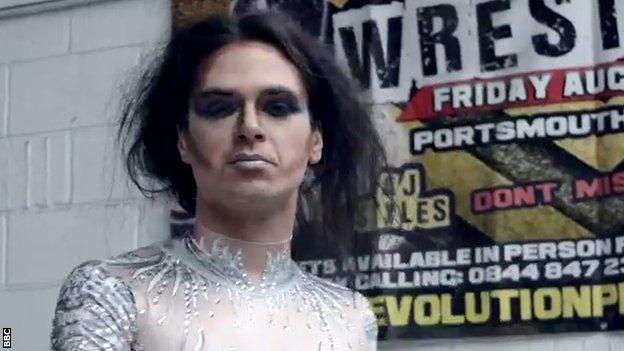Pride Month and wrestling: 'We've got men, women, those that haven't made up their minds yet'
- Published
Archive: Priscilla, 'queen of the wrestling ring' - from April 2019
Ollie Burness always dreamed of making it as a professional wrestler. He just never imagined he'd do it like this.
"If I could go back to the time when young Ollie was first thinking Priscilla up, I'd probably have told him he was crazy," Burness laughs.
After all, the persona he created was virtually unprecedented in British wrestling - a lip-syncing, spandex-wearing drag queen that was a million miles away from the no-nonsense grapplers who had traditionally dominated the UK scene.
And yet, the character caught on - and in less than a fortnight, Priscilla will be one of the headline acts at the UK's first Pride-themed professional wrestling show.
Pride of the Ring, in Blackpool on 11 June, will feature LGBTQ+ performers from across Britain - and follows the example of similar Pride-themed events that have taken place in the United States.
To mark the start of Pride Month, Burness has been speaking to the BBC's LGBT Sport Podcast about the significance of that event, the creation of the Priscilla character, and about his own development, inside and outside wrestling.
'People told me I had to be more masculine, but that wasn't me'
Burness was 10 years old when he first saw professional wrestling on television.
"The costumes, the action… it was like watching a martial arts film come to life," he remembers.
"I turned to my dad and told him that was what I was going to do as a job."
He began training at a wrestling school close to his home near Portsmouth, and it wasn't long before he was competing in his first matches. But as his career developed, Burness became frustrated with the lack of opportunities that were coming his way.
"I was hitting my 20s, and not getting the work I wanted," he says.
"People used to say to me all the time: 'You've got to be more masculine, you've got to get bigger, you've got to deepen that voice and talk like a man and then they'll respect you.'
"I tried all that, but it just wasn't me. I was about getting camp at the disco and lip-syncing to songs! So when I realised drag queens also did that, I thought it was something I should just lean into."
And with that, Priscilla was born.
'She was my way of turning what people saw as a weakness into a positive'

Priscilla will compete at the Pride of the Ring event in Blackpool on 11 June
It was a persona that grew, in part, out of Burness' frustration with professional wrestling's attitude to the LGBTQ+ community.
"I was openly bisexual, and people would tell me for my own benefit not to speak about that," he says.
"I went through some very difficult times with it - and Priscilla was a defence mechanism against it. I had no real shame in myself, and Priscilla was my way of turning what people saw as a weakness into a positive."
That's not to say the character - a sassy, self-proclaimed 'exotic diva' who styles herself as Britain's 'Queen of the Ring' - caught on immediately.
Anxiety about how the audience would react to a drag queen wrestler left Burness on the verge of panic attacks before matches.
And while some, like hen parties, enjoyed the Priscilla persona, there were nights when her entrance was met with derision, or even silence.
"I used to perform her as a villain, because people thought it would be easier to boo her," Burness admits.
"But now, I'm out there as a positive influence. Younger and older people see Priscilla make an absolute fool of herself before a match, then slap the bejesus out of her opponents.
"I get a lot of people who say they walk away a lot more confident after seeing Priscilla, because they know whatever they do isn't going to look half as ridiculous compared with her."
'We've never had a show like this in the UK before'
It's all a far cry from how things were when Burness began in the industry, two decades ago.
"When I started in 2002, you'd struggle to find enough openly LGBTQ+ talent to have even one match on a show," he remembers.
"Now we're seeing people coming in who are much more confident in themselves, right from day one. It's a more colourful wrestling scene emerging, with young characters who are dressing up in these rainbow outfits. I never would have had the guts to do that in my 20s."
Many of those talents will be at Blackpool's Funny Girls cabaret venue this month for Pride of the Ring.
The Pride-themed event - promoted by Burness on behalf of Preston's PCW [Pro Championship Wrestling] group - will be a first for the UK.
"We've never had a show like this here before," Burness says.
"We've got a variety of matches and talent. We've got men, we've got ladies… we've got those that are yet to make up their minds.
"This is a big opportunity for a lot of people, so I think now is the time for us to take the ball and start running with it."
There is a big opportunity too for Priscilla who, after winning PCW's Road to Glory tournament, has a guaranteed shot at its world heavyweight championship title at some point in the future.
And while that may be on the mind of Burness' lip-syncing alter-ego, he's firmly focused on the significance of this event.
"The show is everything I'm thinking about right now," he says.
"We have this platform, and it will demonstrate what LGBTQ+ talent can bring to the table."
Priscilla (aka Ollie Burness) was speaking to Jack Murley on the BBC's LGBT Sport Podcast. You can hear new episodes every Wednesday on BBC Sounds.